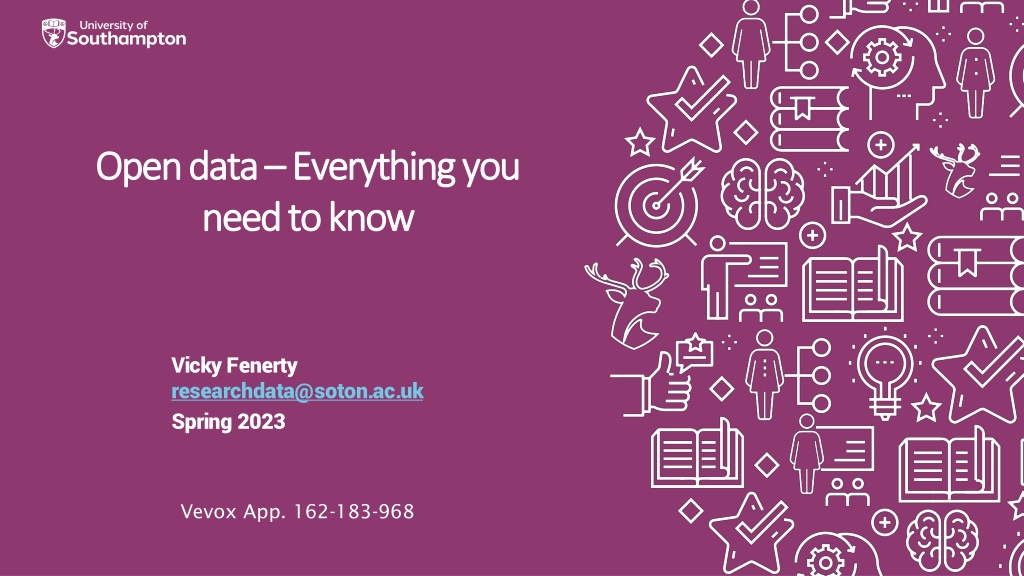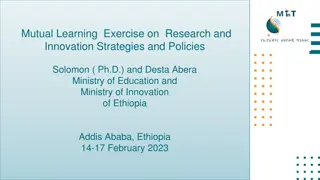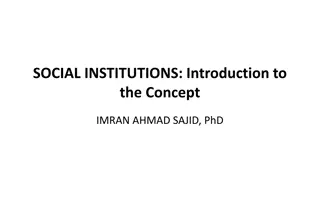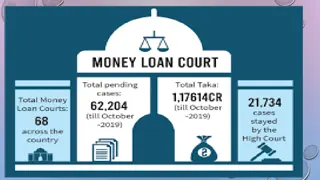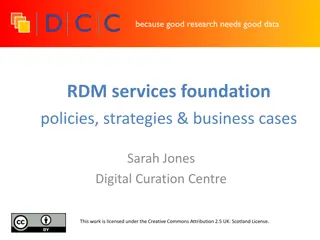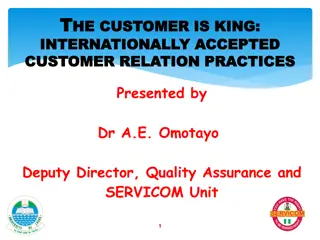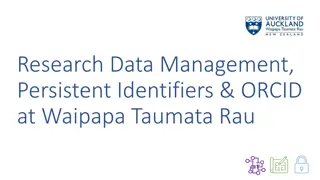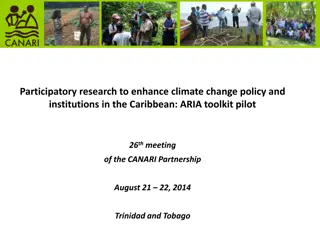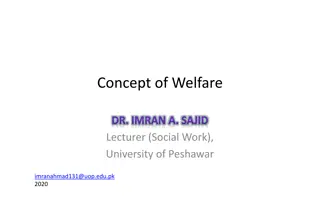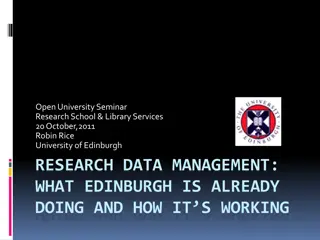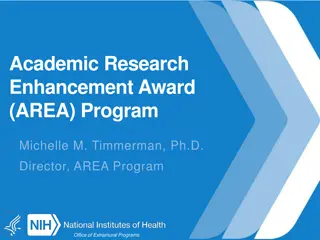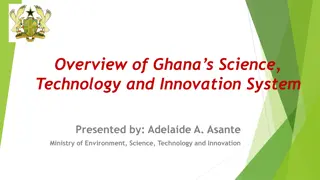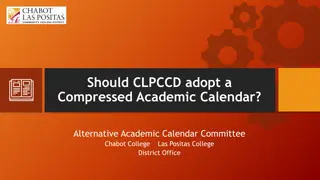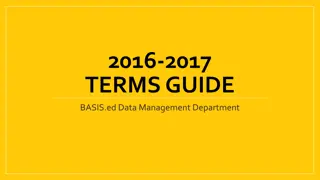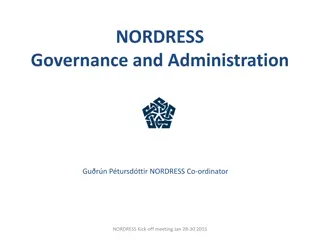Understanding Research Data Management Policies in Academic Institutions
Explore the evolution of open data and the Open Science Movement, including the FAIR principles and examples of research data initiatives. Learn about university research data management policies, emphasizing the importance of data sharing and the role of metadata in research reproducibility.
Download Presentation

Please find below an Image/Link to download the presentation.
The content on the website is provided AS IS for your information and personal use only. It may not be sold, licensed, or shared on other websites without obtaining consent from the author. Download presentation by click this link. If you encounter any issues during the download, it is possible that the publisher has removed the file from their server.
E N D
Presentation Transcript
Open data Open data Everything you Everything you need to know need to know Vicky Fenerty researchdata@soton.ac.uk Spring 2023 Vevox App. 162-183-968
Supplementary Data Published separately On microfiche Only for certain journals 2
Open Science Movement Open science (open research) is more than just open access to journal papers Research data was a latecomer to the movement until Image: UNESCO Open Science brochure 3
The idea that scientific research should be free to all was popularized by Robert King Merton in the early 1940s. Research (which produces data) should be shared freely for the common good. In 2005 we have the Open Definition Open data and content can be freely used, modified, and shared by anyone for any purpose 4
FAIR principles https://commons.wikimedia.org/wiki/File:FAIR_data_principles.jpg CC-BY-SA 7
University Research Data Management Policy Definition 1.3 Research Data means information in digital, computer-readable format or paper- based that: 1.3.1 is contained or presented in various ways including notes, facts, figures, tables, images (still and moving), audio or visual recordings; and 1.3.2 which is collected, generated or obtained during the course of or as a result of undertaking research (which includes but is not limited to conducting field or laboratory experiments, conducting trials, surveys, interviews, focus groups or analysis of data); and 1.3.3 which is subsequently used by the Researcher as a basis for making calculations or drawing conclusions to develop, support or revise theories, practices and findings http://www.calendar.soton.ac.uk/sectionIV/research-data-management.html 8
9 University of Portsmouth Research Data Management Policy Overview of Key Policy Points a. There is now a need to include a Data Availability Statement (or equivalent wording/information in a data/methods/acknowledgement section) in all papers, whether or not the journals require them. b. Data sharing where possible/applicable is a requirement for data held by UoP. The minimum requirement is metadata necessary for reproduction of research results, with the best practice recommendation being making research data publicly and openly available to maximise the benefit for the academic and the institution. Depending on the subject area a publication in a data journal describing a dataset may be appropriate. c. Data deposition information must be made discoverable in Pure if the data are deposited externally. 9
10 University of Brighton Research Data may be digital or analogue (e.g. paper-based) data that are collected or generated during the course of or as a result of undertaking research. Research data will be created, amongst other routes, through conducting field or laboratory experiments, conducting trials, surveys, interviews, focus groups, practice-based research or analysis of data. On completion of the project, the final anonymised research dataset must be cleaned, ensuring compliance with the University s Data Protection Policy and deposited in the University data repository along with an updated Data Management Plan. Researchers who deposit research data sets in a national or international repository must only do so if conditions for access have been considered and agreed by the Pro-Vice-Chancellor (Research & Enterprise) or delegate and the funding body requires it. 10
Data lifecycle Plan Re-use Collect Share Process Preserve Analyse 11
Can you use someone elses data? Yes! But need to check reuse licence to see what you can do with it. Where to find it Within research articles - look for a dataset Data Journals. These are journals that publish and share datasets. Data repositories Register of Research Data repositories re3data.org good place to start also Dryad, Figshae and Zenodo. Government web pages Data.gov (UK), Data.gov (USA), Data.gov (Australia), Data.gouv (France) Google Dataset search 12
13 Some examples Ella Chadwick - Psychology https://eprints.soton.ac.uk/442080/ Anna Ostrowska - Film https://eprints.soton.ac.uk/432604/ Charlotte Owen - Psychology https://eprints.soton.ac.uk/468490/ Please ensure that any issues have been addressed re sensitive data consents and sharing before you collect any data. This will ensure that creating datasets to support publications as well as for your final thesis are straightforward. Please see Briefing document to guide you. 13
Library Research Data Service https://library.soton.ac.uk/researchdata/home 1. Review Data Management Plans for funding applications Please email researchdata@soton.ac.uk for help and guidance if you are analyzing secondary data sets or if you are creating your own. 2. Support on how to plan for data sharing if using sensitive data Ensure that you remember the FAIR principlesto ensure your data is as open as possible and closed as necessary 3. Support publication of underlying data Readme files - DOIs 4. Quality assurance for outputs with UoS DOIs check ORCIDS and metadata 5. Contact point for all on-request datasets held at the University 6. Provide RDM training and advice for PGRs We offer a weekly Research Data Q&A for all staff and PGRs please book here Vicky Fenerty Research Data Team 14
ORCiD An ORCID iD is a digital identifier, used worldwide, that you own and control, and that distinguishes you from every other researcher, even if you move institution or change name. ORCID iDs look like a credit card number: 0000-0001-8414-9272. You can connect your iD with your professional information - affliations, grants, publications, peer review, and more. You can use your iD to share your information with other systems, ensuring you get recognition for all your contributions, saving you time and hassle, and reducing the risk of errors. You can register for an ORCID iD or to connect your existing ORCID iD with the university by using Pure Some publisher submission systems require authors to login with their ORCiD https://library.soton.ac.uk/orcid https://library.port.ac.uk/w221 16
Library Research Services Research Outputs, Publications, Open Access (including funder policies) and REF, ePrints Soton Email: eprints@soton.ac.uk Research Data, Research Identifiers e.g. DOI & ORCID, Data Management Plans, Data Deposit and Storage Email: researchdata@soton.ac.uk 17
18 Questions? 18
